Most Powerful Egyptian Gods: Travel back in time to ancient Egypt, where gods controlled both mortals and immortals alike and myths and tales intertwined with history. A select few deities stood unmatched in strength and influence among the numerous deities that adorned the banks of the Nile. In this fascinating blog article, we wade into the magical world of the most powerful Egyptian gods and reveal the mystifying stories that have fascinated cultures for millennia.
Find out about the gods whose names have resounded throughout time, creating a lasting impression on history and continuing to capture our collective imagination. Join us on a remarkable adventure as we explore the mysteries of ancient Egyptian divinity and the intriguing tales of its most powerful deities.
Recommended: Richest Women in Africa
The Relationship of the Egyptians with their Gods
The Egyptians had a deep relationship with their gods; in them, they found the justification for the things that happened to them, the turns that their lives took, and many parts of the soul and human nature.
Because only priests could enter the official ones, they were worshipped in unofficial sanctuaries and temples instead. They prayed to them, requesting that they act as their representatives, and engaged in a variety of rites to draw closer to their gods.
Many archaeologists and Egyptologists concur that during the time this civilization existed, more than 1,400 gods were worshipped, at least according to the data gathered from ancient manuscripts, even though today we only know a few names.
Recommended: Most Beautiful Universities In Canada
Top 7 Most Powerful Egyptian Gods
1 The Egyptian God, Ra – God of the Sun: As the deity of the sun, creation, and life, Ra is one of the most significant gods in ancient Egyptian mythology. He was revered as the supreme deity and frequently shown as a man with a falcon head and a sun disc on his head. Ra formed himself out of chaos, and then he created everything else, according to Egyptian mythology. He battled the forces of darkness while nighttime journey took him through the underworld and through the sky in a boat.
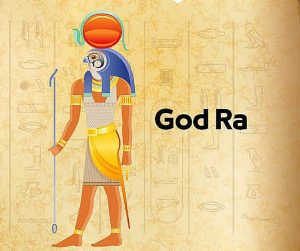
Ra was frequently referred to in spells and prayers for these purposes because of his alleged ability to grant life and heal. Associated with the idea of Ma’at, which stood for harmony and order in the cosmos.
The entire history of ancient Egypt was devoted to the worship of Ra, who had several temples built in his honour. Heliopolis, where a major temple complex was created in his honour, served as the home of his religion.
Ra was extremely well-liked, but when other gods and goddesses rose to prominence in Egyptian mythology, Ra’s significance waned. Nevertheless, his legacy endures, and Egyptian culture today continues to hold a special place in its heart for him.
2. The Egyptian God, Amun – God of The Air: Amun was one of the most feared and potent deities in ancient Egyptian mythology. He was the god of air and wind and frequently shown as a man wearing a tall, plumed hat or as a ram-headed figure.
Originally a minor deity connected to fertility and the beginning of life, he combined with other deities over time, like as Ra and Atum, and his significance increased. As a result, he earned the title of god of the sun and king of the gods, Amun-Ra.
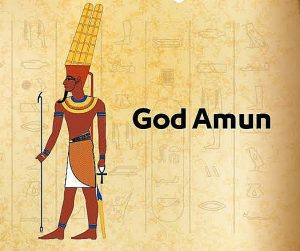
The pharaohs, who thought themselves to be Amun’s living manifestation on Earth, had a close relationship with him. They constructed numerous temples and shrines in his honour, including the well-known Karnak temple complex.
Amun was revered as a god of fertility and the beginning of life in addition to his role as a god of the air. He was frequently linked to the Nile River and the yearly flooding that revitalised the landscape. Amun remained a significant character throughout Egyptian history, and his impact can be observed in many facets of Egyptian culture, including art, literature, and religion. His temples and shrines have been renovated and preserved, and his picture may be found in museums and collections all over the world, ensuring that his legacy is still felt in the present day.
Also see: Best Laptops For Students
3. The Egyptian God, Horus – God of Goodness & Light: Horus is one of the oldest and most important gods in Egyptian mythology, frequently linked to the sun, sky, and kingship. He was connected to healing and protection and was thought to be the god of goodness and light.
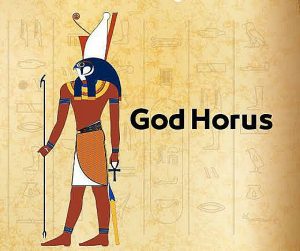
In Egyptian mythology, Horus was a falcon or a man with a falcon head who was said to be the son of Osiris and Isis. He was frequently linked to the Egyptian pharaohs, who were considered to be Horus’ earthly representatives and were thought to possess the power to control the sun.
Horus’ conflict with Set, his uncle and the man who killed his father Osiris, is one of the most well-known tales about him. Legend has it that Horus engaged Set in a series of conflicts before ultimately winning and exacting revenge on him for the demise of his father. The numerous temples and shrines built in his honour all over Egypt are a testament to Horus’ significance in Egyptian mythology. He was regarded as one of the most significant gods in the Egyptian pantheon and was worshipped by both commoners and nobility.
Horus is still a crucial emblem in Egyptian culture today and is frequently portrayed in artwork and construction. His memory continues to motivate people all across the world, and you can find his likeness on anything from vintage jewellery to prehistoric tombs.
Also see: Countries With The Highest Number Of Prostitutes In The World
4 The Egyptian God, Seth – God of War: One of the most complicated and divisive deities in ancient Egyptian mythology is Seth, also known as Set. He was revered as the deity of conflict, turmoil, and storms and frequently portrayed as a terrifying being with an unidentified animal’s head. In Egyptian mythology, Seth was portrayed as a harsh and angry divinity who was seen as Osiris’ competitor and sibling. He was seen as a representation of chaos and evil since it was thought that he murdered Osiris out of jealously.
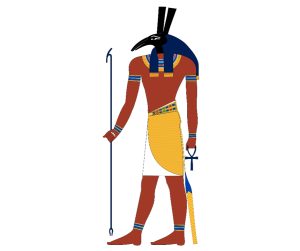
Although Seth had a bad reputation, the Egyptian people and the pharaohs revered him as a strong defender. He was connected to the desert, which was perceived as a hostile and hazardous place, and was thought to have the ability to ward off evil spirits and safeguard travellers.
Seth was seen as having control over the winds and weather and was also connected to storms and other natural calamities. During times of famine or drought, he was frequently summoned in the hopes that he would bring rain and fertility to the Land. Seth’s fame changed significantly over Egyptian history. He was occasionally despised and demonised, but he was also regarded as a vital force in the universe, upholding equilibrium and order by opposing other gods.
Also see: How To Speak In Public Without Fear or Anxiety
5 The Egyptian God, Hapi – God of Fertility: Ancient Egyptian mythology equated the fertility god Hapi with the Nile River’s ability to sustain life. He was frequently shown as a man with protruding breasts and a belly, signifying the fertility and plenty of the land.
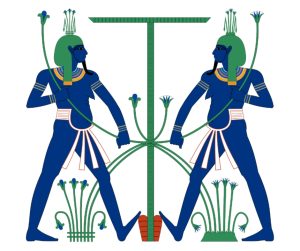
Hapi, the god of the Nile, was revered as the origin of all life and wealth in ancient Egypt. His yearly river flooding enriched the soil with nutrients and rich silt, fostering the growth and prosperity of crops. Because they relied on the river to survive, the ancient Egyptians held him in high regard.
The flooding of the Nile, which was seen as a period of renewal and rebirth, was another event connected to Hapi. Egyptian art and literature frequently featured floods of rivers as symbols of the gods’ power and fertility. Hapi was a significant figure in Egyptian history who had an impact on many facets of Egyptian culture, including art, literature, and religion. His reputation as a deity of procreation and bounty lives on today, and there are museums and collections all throughout the world that have images of him.
Also see: Best Places To Live In Japan
6. The Egyptian God, Osiris – God of Death: One of the most well-known gods in ancient Egyptian mythology, Osiris is frequently linked to the afterlife and the idea of rebirth. He was revered as a fertility and agricultural god in addition to being the god of death.
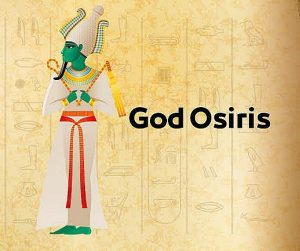
Egyptian mythology claims that Osiris was killed by his envious brother Set, who then dismembered his body and dispersed the fragments all across the landscape. Isis, Osiris’ wife, was able to track down the missing pieces and put them back together, bringing Osiris back to life. Osiris was believed to rule the afterlife as a result of his resurrection, which made him synonymous with the idea of eternal life. He was frequently shown as a mummified pharaoh, carrying the crook and flail as a representation of power.
The cult of Osiris was very popular in ancient Egyptian religion, and he had numerous temples built in his honour. The most well-known of these was the Abydos temple, thought to be Osiris’ final resting place.
Egyptian afterlife rituals and beliefs bear witness to Osiris’ significance in Egyptian mythology. The ancient Egyptians thought that in order to enter the afterlife, they had to pass trials and exams and have their hearts measured against a feather of truth. In the afterlife, those who passed the test would spend all of their time with Osiris. Osiris is still a significant character in Egyptian mythology and culture, and his life narrative continues to motivate people all over the world.
7. The Egyptian God, Ptah – Creator God & Maker of Things: Ptah was a creator god and the maker of things in the mythology of the ancient Egyptians. He was frequently portrayed as a mummified man carrying a staff and an ankh while donning a skullcap.
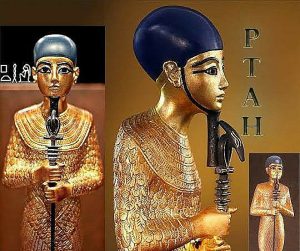
Ptah created the earth and all living things in his role as a creator god. According to tradition, he spoke the world into being and was in charge of making the gods and goddesses who controlled the universe.
Ptah was regarded as having the ability to produce exquisite and complicated pieces of art and building and was also connected to craftsmen and builders. Festivals and rituals were frequently held in his honour, especially while temples and other opulent structures were being built.
Ptah remained a significant character throughout Egyptian history, and his impact can be observed in a variety of facets of Egyptian culture, including art, literature, and religion.
Recommended: Smartest Animals in the world
Conclusion
Ancient Egypt’s history and culture are filled with mysteries that can only be learned firsthand by taking a memorable trip there. The powerful Egyptian gods like Ra and Osiris have fascinated people throughout history. Their ageless appeal and spellbinding tales have endured through the years, leaving a permanent impression on our collective imagination. The enigmatic world of Egypt’s divine pantheon will continue to fascinate and motivate future generations.

Edeh Samuel Chukwuemeka, ACMC, is a lawyer and a certified mediator/conciliator in Nigeria. He is also a developer with knowledge in various programming languages. Samuel is determined to leverage his skills in technology, SEO, and legal practice to revolutionize the legal profession worldwide by creating web and mobile applications that simplify legal research. Sam is also passionate about educating and providing valuable information to people.